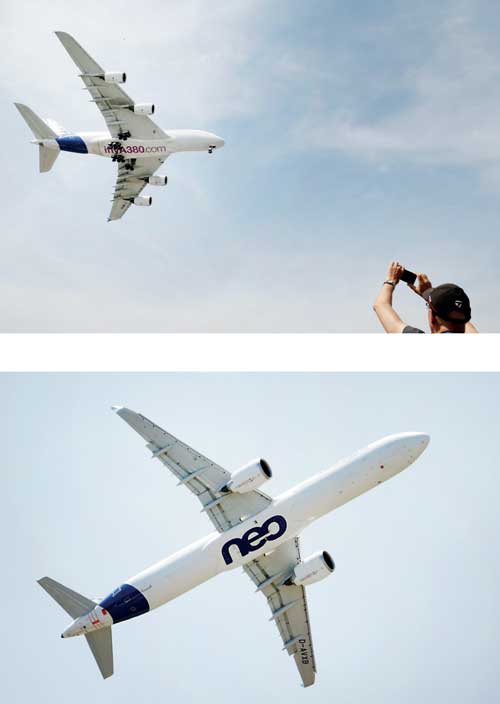Sunday Feb 22, 2026
Sunday Feb 22, 2026
Tuesday, 27 June 2017 00:00 - - {{hitsCtrl.values.hits}}
PARIS (Reuters) - Airbus Sales Chief John Leahy scoffed at Boeing’s claims about the efficiency of a new 737 jet that has been grabbing orders and headlines at the Paris Airshow, but played down expectations of a last-minute comeback to win the event.
Speaking to Reuters on day three of the 1-25 June show, Leahy said: “We will have some orders today, but today’s isn’t going to be one of our record air shows.”
Regarding orders that Airbus could get over the rest of the show, Leahy added that such deals would be “nothing big, but real stuff” - an indirect reference to conversions from existing models that account for more than half of the orders announced so far for Boeing’s newly launched 737 MAX 10.
Boeing leads the race for net new orders at the air show.
Industry watchers said the veteran Airbus sales chief could pull off a signature last-minute deal to avoid an unusual defeat at the European company’s home event.
Leahy took issue with claims by Boeing that the Boeing 737 MAX 10 is 5 percent more efficient to operate than the Airbus A321neo, which has outsold the smaller 737 MAX 9 by about four to one.
“I am getting to the point where I may run my Pinocchio ad again with the stuff they are saying,” Leahy said, referring to an advertising war between Airbus and Boeing in 2012 over conflicting claims on jet performance.
RESALE VALUES
Boeing says the 737 MAX 10 is a lighter plane with a longer wing, making it more efficient. Airbus says the A321neo has a larger and more efficient engine, giving it an advantage.
Boeing’s development chief said on Tuesday Airbus marketing risked ignoring the “physics of the universe”.
Leahy also said Boeing was putting some of its own sales at risk, rather than denting interest in the A321neo.
“I don’t think we have a real competitor to worry about there. I think the rest of their product line is going to be cannibalised by that aircraft,” Leahy said of the 737 MAX 10.
“Either the MAX 9 or the MAX 10 is going to survive, but one of them has to go,” Leahy said in an interview at what is likely to be his last major air show as he prepares to retire.
He also questioned whether the introduction of a fifth member of the MAX family would allow airlines to preserve the value of their assets for possible resale - a key barometer of aviation finance that influences both old and new prices.
“If you bought a MAX 9 in the past I think you have got to worry about your residual values,” Leahy said.
Boeing Commercial Airplanes Chief Executive Kevin McAllister this week denied the 737 MAX 10 would have any financing issues.
Leahy said he was not worried about an order for 100 Boeing 737 MAX 10s from United Airlines, converted from other models.
“I understand that United have an agreement that they can convert to any member of the MAX family that they want to, and can convert back if they want to, so we don’t see that as a competitor to having the A321 one day be introduced to United.”
Asked to comment on Leahy’s remark, a Boeing spokesman said: “They (United) selected the 10.”
PARIS (Reuters) - European planemaker Airbus will fit ejectable flight recorders to its long-range A350 jets from 2019, meaning they could float in the event of a crash at sea, the company said last week.
It will also start to fit new fixed recorders to both short-range and long-range jets that can store 25 hours of voice and data information on a single recorder.
Currently, the “black boxes” of an aircraft are two separate recorders, one for voice and one for flight data, with the voice recording only covering two hours.
The ejectable or “deployable” recorders would separate from the tail during a crash and float, emitting a distress signal. Flight recorders at present emit acoustic signals for 30 days after a crash, giving search teams fewer than three weeks to locate them in what can be deep waters.
Recommended by investigators after an Air France A330 jet crashed in 2009, the idea came to the fore after the disappearance of Malaysia Airlines flight 370 in March 2014, for which the recorders still have not been found.
The new ejectable recorder, which Airbus calls the Automatic Deployable Flight Recorder (ADFR), is made by L3 Technologies and can record up to 25 hours of voices from the cockpit and flight data.
The ejectable black box is also aimed at the other longer-range planes made by Airbus such as the A321LR, the A330 and the A380. The long-range planes would have both an ejectable and fixed recorder, while short-haul aircraft from the A320 family will be fitted with two of the fixed recorders, Airbus said.
However, some in the industry have expressed doubts over ejectable black boxes, saying they could deploy accidentally, while others have said they would prefer live streaming of data.